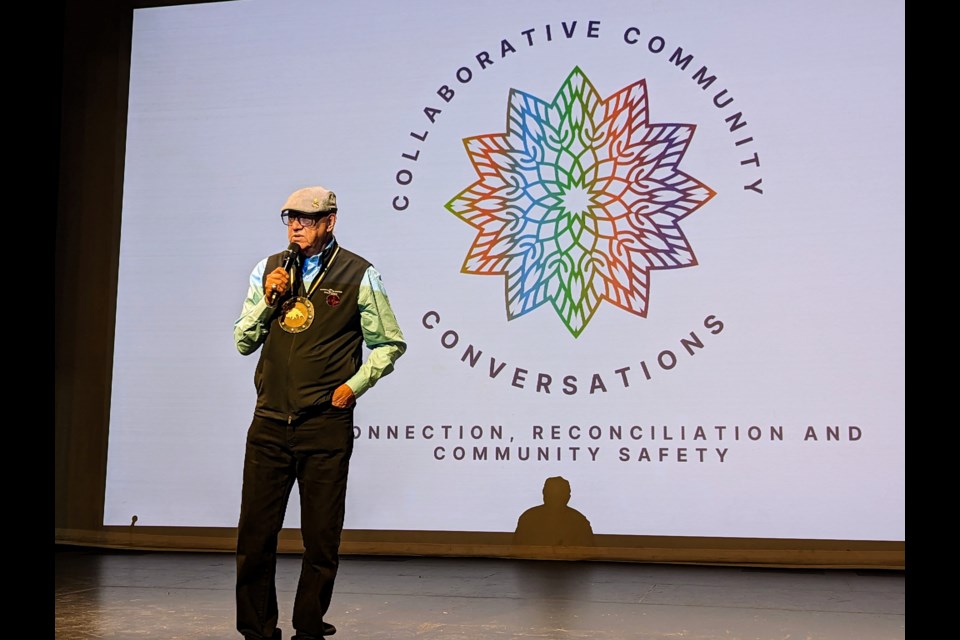An audience gathered at the Moose Jaw Cultural Centre on April 27 to hear speakers address topics such as systemic racism, the legacy of residential schools, intergenerational trauma, homelessness, and more, in a discussion that was unusually raw, authentic, and frank.
The event was a Collaborative Community Conversation organized by Lori Deets, chairperson of the Wakamow Aboriginal Community Association (WACA); Sarah Simison, executive director of the Moose Jaw Cultural Centre (MJCC); Gwen Fisher, head librarian at the Moose Jaw Public Library (MJPL); and Della Ferguson of Square One and Journey to Hope Moose Jaw.
Hayley Hart-Rushinko was the day’s emcee.
The doors opened at 10 a.m., with an opening message from Deets and Fisher at 10:30. The duo opened the event with an unconventional land acknowledgement that Deets hopes encourages others to seek greater sincerity for such messages.
“I didn’t copy and paste from anything online, I just did it based on my own knowledge and what Gwen knows,” Deets explained. “To me, that’s the epitome of learning: What can I actually say about my relationship to the land without notes in front of me? For some of us, that question will take some work, and for some of us it’s easy, but you can’t do a land acknowledgement without knowing what your personal relationship to the land is.”
Eugene Arcand was the event’s first speaker. Arcand is a Cree Elder from the Muskeg Lake First Nation in Saskatchewan who was only five years old when he was forcibly removed from his home sent to a residential school.
He wasn’t allowed to leave until 11 years later — the schools turned that five-year-old into a violent, hateful person who struggled with addictions and antisocial behaviour for many years, he said. Elder Arcand told his story to TSN.ca. Links to that story are included on his speaker page on the Collaborative Community Conversation page.
He pulled very few punches in his presentation, frankly and emotionally talking about the sexual, emotional, and physical abuse he endured throughout his childhood.
Arcand recognized police and other officials in the audience, including Chief Rick Bourassa of the Moose Jaw Police Service and other senior officers, and at one point had an emotional exchange with Clive Tolley, the mayor of Moose Jaw. He thanked them for their presence and efforts toward Truth and Reconciliation and acknowledged that he and his fellow survivors have struggled all their lives to trust authority figures like police and government.
“We have to be honest with each other,” Arcand said. “I’m not here to tell you that everything about residential school was bad, but I’m here to tell you that very little of it was good, and I wouldn’t wish it on any child.
“Think about your child, your grandchild. What would you do? If (they were taken from you?) … Use your worst imaginations to see how our children were hurt and traumatized and brainwashed. When the term ‘genocide’ came out, I had no problem accepting it, because I was a witness.”
Arcand said he has a duty to his people and himself to tell the truth.
“It’s sometimes very unpleasant, very uncomfortable,” he said. “How many schools in Moose Jaw have a graveyard in their yard? The 17 Indian Residential schools in Saskatchewan all had graveyards … yet we’re the ones deemed to be dysfunctional.”
Gwen Fisher said she was pleased with the number of people who attended for the full-day event. All proceeds are going to help WACA establish a Community Safety Host program based on a model being pioneered in Winnipeg. The program is Indigenous-led and community-based, and qualifies graduates as security guards in addition to giving them training in essential and often-ignored skills like de-escalation, psychological first aid, trauma-informed care, and harm reduction principles.
“Like Eugene said (in his presentation), it takes courage to enter into discussion territory that might feel difficult or heavy, so I’m proud of everybody who came out today,” Fisher said.
“These social issues we’re facing have deep stories behind them, and when we know some of those deeper stories we’re better equipped to navigate them, and we become more genuine in our reconciliation. It isn’t simple, so what we hope will happen as a result of today is more appreciation of the complexity and depth of the subject.”
“I’m a member of WACA, and I came to this because I want to help my community,” said Jazenta Saultier. Saultier is a member of Peter Ballantyne Cree Nation in Treaty 6 territory and an Indigenous beadwork artist.
“We are a community, we want to live together, so we need to learn together and help each other. The only way we’re going to become a happy, loving, and growing community is to come together and listen to each other’s stories.”
Other speakers at the event included Dr. Amanda Gebhard from the University of Regina, who presented from her research on oppressive systems; Heather Carter, a Métis woman from Prince Albert who recently completed doctoral studies; and Michael Redhead Champagne, an Ininew public speaker, writer, and community advocate from Winnipeg who is heavily involved in the development of the Community Safety Host program there.
MooseJawToday.com will cover the final speakers in a separate article.




